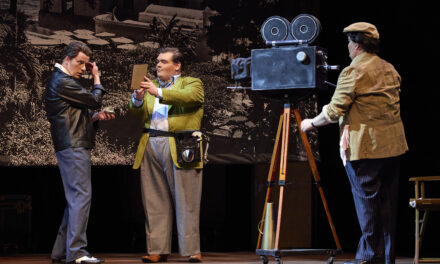Six feature horror films from the unexpectedly gripping to the sub-par

Review by Wade Buckley
The camera pans down to reveal two elderly women, walking through the Australian bush covered in blood. They bicker with each other, neither one accepting blame for the current situation they are in. Suddenly they see a house in the distance. You think that they’ve found help. Instead, they pull zebra masks over their faces, sneak into the house, and murder the woman who lives there. The two women leave, cackling, excited that they managed to pull it off. Margery at the nursing home bet a month’s worth of tapioca pudding that they wouldn’t be able to kill someone. That’ll show her.

What I just described was Zebra, a short horror film directed by Peter Spann, which showed at the Edmonton Festival of Fear (EFOF) from Oct. 11 to 13. Taking place at the historic Princess Theatre on Whyte Ave., the EFOF showed over fifty short and feature length horror films just as, if not more, vibrant and bizarre as Zebra. While I can’t extensively cover all fifty films, I can review the six features I managed to see.
The festival proper began with Reborn, a sci-fi film by director Julian Richards, which follows a young woman named Tess, who was a stillbirth but is somehow brought back to life by an electrical shock. Now grown up with electro-kinetic abilities, Tess seeks to reunite with her mother who she thinks left her for dead, for better or worse.
I was optimistic about Reborn, especially at the start. The Frankenstein-ish plot had potential to explore interesting themes of maternal rejection and abandonment. I wanted the film to do this through the lens of a sci-fi horror, and I truly believed that that was what I was going to get in the beginning.
I have to commend Reborn’s lighting team for some astonishingly well-done work, which not only set up the tone but also drove home thematic points as well. The visual composition alone made me feel like I was in for something great.
Unfortunately, any goodwill Reborn had going for it vanished with the sub-par execution of its story. Character motivations are weak at best, as the film tells the audience why someone is doing something but never shows those motivating events. It’s difficult to get invested into the characters for any reason besides the movie stating that you should be. Additionally, the last five minutes of the film are so bad that it is almost insulting. The worst part is that if you just cut those last five minutes out the film wouldn’t lose anything. The fact that I had such high hopes Reborn makes its valleys feel so low, and I can’t truly recommend it, despite its technical competence.
The other feature film on the Friday was Infection, a Venezuelan zombie film by director Flavio Pedota. Matthew Blake, the film’s composer, was in attendance and introduced the film. He said that while Infection is a zombie film, Pedota’s vision for the film was to make a statement on the current economic crisis in Venezuela. Infection demands multiple viewing to catch every reference Pedota includes, ranging from painfully apparent to masterfully subtle. Each one I caught hit like a ton of bricks, painting a terrifically tragic picture of the current state of the country.
Beyond that Infection is beautifully shot and unbearably suspenseful. Pedota masterfully balances the gorgeous Venezuelan landscape with destitute buildings and chaotic action when the zombies are on screen. When all of those elements come together, Infection completely enthralls you visually, but pulls you in even further with the emotions it evokes.
It is not the zombies that create the horror in Infection, but rather the oppressive desperation that runs thorough out. Desperation that causes man to turn against man. Desperation that creates situations where empathy for another person can get a person killed. It is a desperation that one will inevitably succumb to, no matter how hard you fight against it.
It is not all desperate, however. Pedota’s decision to make young children immune to the contagion inspires hope that the children of Venezuela have the potential to create a better future. I left on Friday night wanted nothing more than to watch Infection again. I knew that there was even more that Pedota had put into the film that I wasn’t able to pick up on the first time around. It was a strange feeling too be sure: anticipation to watch something a second time is rare, and I believe that says something about Pedota’s ability as a director.
The first feature of Saturday was Beyond the Woods, which received its world premiere on the Festival of Fear stage.
Directed by Canadian Brayden DeMorest-Purdy, the plot of his first feature film follows Jack (played by Jeff Evans-Todd) who is staying at his brother-in-law Andrew’s (played by Steven Roberts) house before his sister’s funeral. The longer Jack stays at the isolated winter homestead, the more suspicious he becomes of the circumstances of his sister’s death. Unfortunately, I can’t say more than that without spoiling the plot a bit.
This was one of my favorite films, largely because of how well DeMorest-Purdy’s directing style brings out the performances of its two main actors. Some of the takes are almost tortuously long, where the actors slowly but completely bring out the turmoil experienced by their characters. Evans-Todd’s terrified and desperate performance as Jack contrasts the cold alienism that Roberts brings to the role of Andrew, and as the plot continues the audience cannot help but become invested in the deeply personal conflict between the two. These factors, along with great overall cinematography and an unreliable narrator in Andrew, make Beyond the Woods painfully suspenseful as it plays with the horror of not truly knowing what a person you know is capable of doing.
Saturday’s second feature film was Jade’s Asylum, a psychological horror from Canadian director Alexandre Carrière. The plot was fairly simple: attendees of a housewarming party at a Costa Rican mansion are slowly hunted down and mutilated by strange men with seeping fungal growths all over their body. Our protagonist Jade (played by Morgan Kohen), also suffers from psychosis, where she is taunted and berated by a vision of her dead father. However, Jade’s Asylum is by no means a simple film.
Carrière also serves as writer and editor on the film, and he uses montage editing to disrupt the time and space of the film to make it feel like the events are happening both non-chronologically and simultaneously. This style of editing makes the threats of Jade’s psychosis and the fungal killers in the woods feel all-encompassing and inescapable. For example, while Jade is hiding from the killers the film cuts between multiple different incidents were, she is hallucinating a verbal berateing from her father’s ghost. This makes it feel like the demons in Jade’s head are just as present and threatening as the ones outside.
While Carrière’s editing style isn’t for everyone, I praise it nonetheless, as it succeeds in creating a film that explores the horror of both the mind and body so effectively that it seems almost intuitive. However, montage editing always makes a difficult watch, so Jade’s Asylum is a risky pick for a more casual film fan.
Unfortunately, I wasn’t able to see the rest of Saturday’s films. I heard on Sunday that they were very well received. Blind, Sunday’s first film and the one I was most excited to see, I thought was a good movie, but unfortunately wasn’t what I had expected.
Directed by Marcel Walz, Blind follows former actress Faye (Sarah French) who is coming to terms with her disability a year after being blinded after botched laser eye surgery. However, Faye is not living alone, as masked killer Pretty Boy (Jed Rowan) has been occupying the parts of Faye’s house she can no longer access.
Blind has a lot working for it. Set design, blocking, lighting, cinematography, and French’s performance as Faye are all stellar. French especially sells Faye’s blindness as well as the pain and isolation that she is suffering because of it. Faye’s characterization makes Blind’s ending especially tragic, as Faye’s efforts to heal and overcome her disability is ultimately what damns her.
Sadly, this is not enough to elevate Blind towards being excellent film, as Pretty Boy has nearly no reason to be there. Visually he is terrifying and memorable, thanks to his costume design and Walz direction of the horror scenes. Seeing Pretty Boy standing where Faye can’t see him is spine-chilling. However, all we really know about Pretty Boy is that he is motivated by wanting to get close to Faye. Is it romantic? Probably. Does he want to be with her, or kill her like his other victims? Can’t tell you. Who was he before he was Pretty Boy? I suppose he had always been Pretty Boy.
Granted, with masked killers generally the less we know the better. The audience’s imagination filling in the gaps does a better job than whatever a writer can come up with. However, if we know nothing about him it makes Pretty Boy feel out of place in his own movie.
The final feature of the festival was the world premiere of Payment Received, directed by J. Writer Ward. Payment Received was the inverse of Blind; I didn’t expect much from it but it turned out to be one of my favorites.
The film follows members of a band from L.A. and their friends, who have rented out a house in Jackson, MI for a life changing audition. However, the group is quick to find out that the house is already occupied by masked occupants who want them dead.
Based on this plot I had anticipated Payment Received to be fairly generic and formulaic, and plot-wise that turned out to be mostly true. However, the film is elevated by the performances of the cast. Every member of the main cast absolutely sells each of their characters. I’m not certain if I’ve ever had so much fun watching people be tormented by sadistic killers.
Additionally, Ward’s direction and the set design of the house in general leads to some genuinely terrifying moments, where the masked killers can be seen hiding in the periphery of certain shots. As they lurk out of sight of the residents, the tension in the first two acts is palpable. Unfortunately, when you have such a charismatic cast, the more characters you kill off the less fun the third act becomes. Although having a cast so likable that you don’t want the film to get to the third act is a nice problem to have.
I left EFOF feeling satisfied, but exhausted. Watching horror films all weekend is taxing on both the mind and lower back. However, I am excited to return to EFOF next year, and to check out any other independent film festivals that could be happening in the future.
Some of the films I had seen I had recommended to my friends and fellow film-geeks right after I had seen them, desperate for other people to check these films out ASAP so we could discuss face-to-face. It’s very likely that I would have never seen any of these films, for better or worse, if I hadn’t leapt feet first into the EFOF, and it would have been a shame if I hadn’t.


